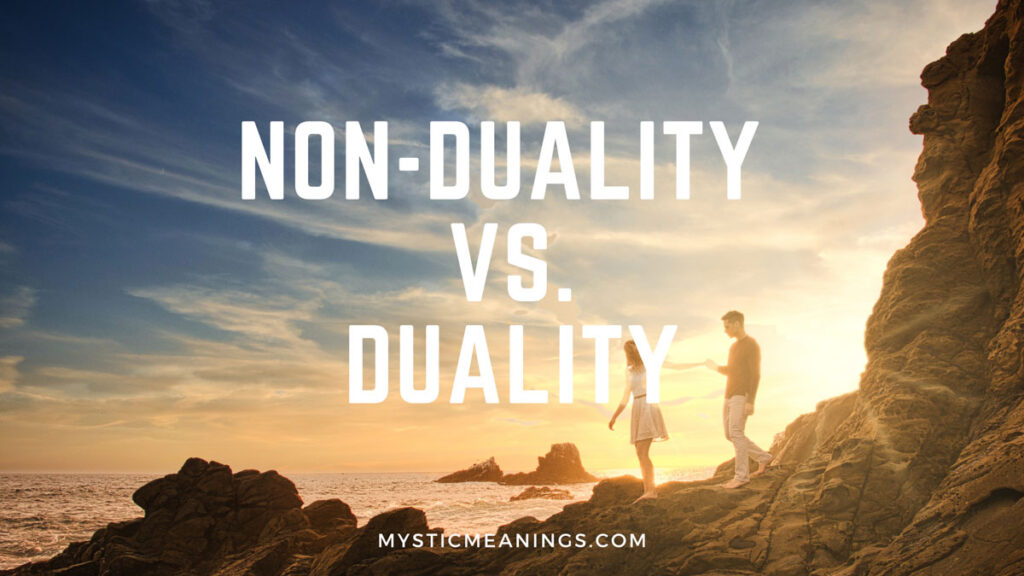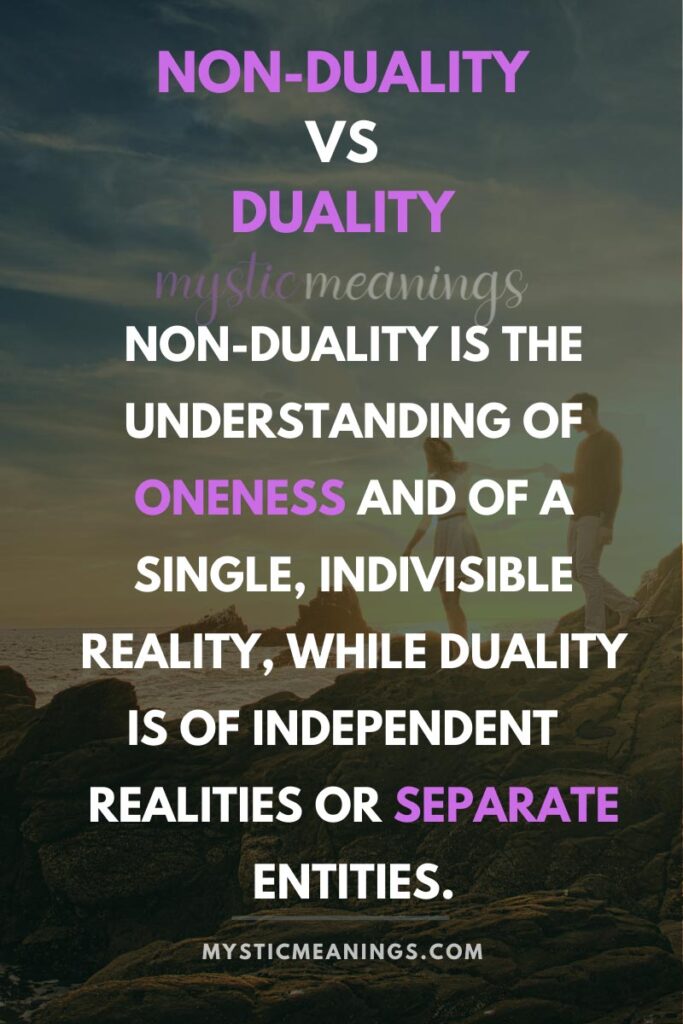Are you keen to know the differences between non-duality vs duality? They are believed to be derived from different schools of Hindu philosophy, imparting distinct ideas about reality.
Non-duality is the understanding that everything is part of one indivisible reality, while duality claims that everything is made up of independent realities or separate entities.
We may think these philosophies are either contradictory or complementary. But, in reality, can they co-exist?
Continue reading to learn more about non-duality vs duality.

History of Non-Duality and Duality
Advaita Vedanta in Hinduism, Advaya in Buddhism, Sufism in Islam, Christianity, and many other religions show association with non-duality. This concept, where the self (Atman) gets assimilated with the one and absolute reality (Brahman), is considered to be peaceful and an emancipator of all mental compartmentalizations.
At the same time, dualism, a derivative of the Hindu philosophy of Dvaita, divides reality into two segments. In dualism, the Brahman, or the ultimate reality, exists independently from “Jiva,” or the soul. This concept is also common in various religious beliefs and philosophies.
So, in which aspects do non-duality differ from duality?
What is Non-Duality?
Non-duality is about achieving a higher level of consciousness or a greater awareness where the self or Atman is not separate from Brahman or the ultimate reality. We can call this “greater awareness” non-dualistic thinking. This awareness is free of the burden of our thoughts which gives birth to the pain of being in contrast with the present reality incessantly.
What is Duality?
Dualism is closely associated with the Dvaita Hindu school of Philosophy. It is in stark contrast to the non-dualistic concept of “Aham Brahman Asmi” in the Brihadaranyaka Upanishad, where the self is the reality or Atman is the Brahman.
The Dvaita school says that the Vishnu or God or Brahman or the supreme reality is independent, and that Vishnu (God) is in charge of all the occurrences in the universe. The other one of reality, the Jiva or soul, is a separate existence.
So, an individual soul or Jiva can be a reflection of the Brahman or Vishnu, but the complete union of the Jiva with the Brahman is not possible.

Non-Duality in Various Religions
Non-duality has “Moksha,” or the ultimate liberation/enlightenment, as one of its main concepts. This freedom or enlightenment makes you oblivious of the burden of your thoughts and helps you to experience “Satchitananda,” or the state of peace, consciousness, and absolute truth.
In the Viveka-Chudamani, Adi Shankaracharya, the most respected preacher of Advaita Vedanta, writes that you can only achieve Moksha when your own eyes are opened to possibilities or greater knowledge by your insight.
This concept of Moksha, associated with non-duality in Hindu Advaita Vedanta, is also present in religions like Buddhism, and Jainism.
There is also a similarity between the concept of “Moksha” in eastern religions with the concept of “Salvation” in Christianity. On the one hand, the “Christian Contemplation” teaches the followers of Christianity to have an awareness of the existence of God.
On the other hand, the Doctrine of Deification teaches that salvation is achieved when the soul becomes unified with God.
Once again, the Mystic branch of Islam, Sufism, shows a close association with non-duality. One of the most prominent Sufi writers, Rumi, writes in his Kulliyat-e-shams, 2114,
“Apparently two, but one in soul, you and I/We feel the flowing water of life here.”
Again, in The Divani Shamsi Tabriz XV, Rumi expresses beauty as “the seer and the seen” as well as “knower and the known,” echoing the concept of non-duality or, more specifically, the concept of “Sakshi.”
The “Dua” or prayer of prophet Muhammad to God for showing him the ultimate reality is also very much in the non-dual concept of ultimate awareness or enlightenment.
Along with Hinduism, Christianity, Buddhism, Jainism, and Islam, non-duality is also present in Judaism, Taoism, Sikhism, Neo-Platonism, Chinese Yin and Yang philosophy, etc.

Duality in Various Religions
Duality has its root in the Hindu school of Dvaita Vedanta. It preaches the difference between the supreme reality or Brahman from the Jiva or soul.
Here, unlike non-duality, the soul is not the universe but the shadow of the Brahman or Vishnu. Again in the Samkhya and Yoga schools of Hindu Philosophy, the reality is made of two components, “Purusha,” or awareness, and “Prakriti,” or the materialistic world.
However, duality corresponds to the Buddha’s belief in non-duality. According to Lord Buddha, and the words of Nagarjuna in the Mulamadhyamakakarika, the materialistic world or Samsara or the ultimate consciousness or Nirvana are not two different entities.
Also, Lord Buddha preaches that our ultimate awareness is not absent or in conflict with our previous experience. Rather, these two elements exist simultaneously, complement each other, and finally get unified to form the basis of the one and absolute reality.
However, many philosophers of Buddhism found duality to be the ideal concept where the “four standard elements” or “Buddhist atoms” or the foundations of reality are different from Buddhahood or the states of awareness.
Duality is also about a belief in two equally powerful but opposite forces. And the traces of the same can be found in the Christian concept of “Good and Evil.”
You will also see the association of duality with religions like Confucianism and some views of Zoroastrianism.
Comparing Non-Duality and Duality
The basic concepts of non-duality and duality are different as one harps on the theory of one and absolute reality, and the other sees two contradictory and complementary elements in reality. However, if you explore various religious views, you will probably find the simultaneous existence of these two concepts.
For example, the Advaita Vedanta school of Hinduism talks about the oneness of the Atman and Brahman. On the contrary, the Dvaita school highlights the difference between the Brahman and the Jiva or individual soul.
Similarly, the concepts of Advaya or non-duality co-exists with Buddhist Atomism in Buddhism. Even, Christianity as a religion is both monotheistic and dualistic.
So, by referring to Hegel’s dialectics, we can infer that it is impossible to know non-duality without understanding duality or vice versa. Probably, by following these two different paths, we will discover our own consciousness or experience of the ultimate reality.
If we look for scientific foundations, both these concepts have enough backings.
Idealism, a concept of Quantum Physics, is related to non-duality, where the absolute reality depends on your consciousness or perceptions. Sir Arthur Eddington writes in his book, The Nature of the Physical World, about how the “knowledge of our environment” is “transmitted along the nerves to the seat of consciousness.”
Similarly, dualism is backed by the scientific theory of Wave-particle duality in Quantum Mechanics. It establishes a paradox in the existence of every entity, which can either be a wave or a particle, depending on the environment it is in.

A Summary of Non-Duality Vs Duality
To conclude, it can be said that non-duality is more peaceful in nature than duality, as it talks about oneness. It also states that God or the One Creator, synonymous with the ultimate consciousness, is within us, and the Lord or the Sakshi or the “eternal witness” can visualize everything beyond the “Gunas” or qualities of our mind.
Non-duality
However, duality teaches us to accept the existence of a greater reality or entity. So, your soul can never be in unification with that greater reality. It also means that your soul and the entire universe in under the control of that supreme reality.
Unlike non-duality, where your enlightenment or Moksha is solely dependent on your human experiences, duality makes you dependent on the supreme entity for salvation.
Non-duality is a beautiful concept or philosophy that is found amongst some of the greatest religions and traditions. You can learn more about them here.

